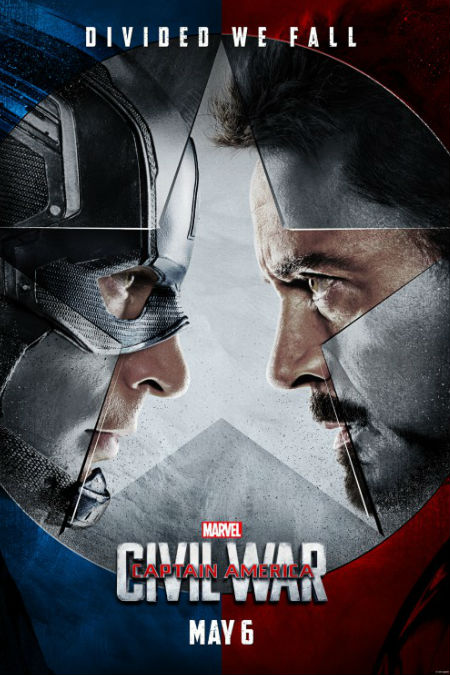
When you walk into a Marvel movie, you can usually be pretty sure of what to expect.
The necessary superhero contingent, either singular or massed, a leering, hubris-drenched baddy with the sort of lac of self-awareness that allows them to think they will emerge victorious, a narrative punctuated by witticisms, grave observations and small characters arcs, and lots of bombastic action including a finale which usually leaves a city/country/major municipal holding in safe but ruined hands.
So far, so little to be surprised by.
And while the Joe and Anthony Russo-directed Captain America: Civil War, the third outing for everyone’s favourite eternally-youthful World War American soldier ticks all the customary boxes with appropriate fanboy and girl glee, it does so with a refreshingly balanced approach that values characterisation and humanity as much as it does the inevitably destructive battles between good and evil.
Or in this case, bar one annoyingly vengeful bad guy, Sokovian intelligence officer Helmut Zemo (Daniel Brühl), who is more bitter, twisted and mournful than he overweeningly nasty, good versus good because as the title suggests, this time the good guys and gals of the superhero fraternity are at war with each other.
It’s all over a high minded principle of course – whether Captain America (Chris Evans), Iron Man (Robert Downey Jr), Black Widow (Scarlett Johansson) et all should remain as freewheeling vigilantes saving humanity where they see fit or if it may be more prudent, given the loss of life and property they leave in their wake, to place them under some judicious oversight, in this case the United Nations, who will decide when and how they should go into battle.
Wearied by a conscience long soaked in regret and sorrow, Iron Man readily agrees, as does his AI progeny Vision (Paul Bettany) and with pragmatic reluctance, Black Widow, to sign what are known as the Sokovia Accords, after the country that was laid waste in the titanic battle that capped the lacklustre Avengers: Age of Ultron.
But Captain America aka Steve Rogers, long wary of those with agendas that can change like the wind, demurs and along with Falcon (Anthony Mackie), Ant-Man (Paul Rudd) and Hawkeye (Jeremy Renner) refuses to have anything to do with the clipping of the Avengers’ wings.
Thus is the stage set, with the addition of the new Spider Man (Tom Holland), back in the Marvel fold at last with gee whiz gungho enthusiam, the brooding Black Panther (Chadwick Boseman), angst-driven Scarlett Witch (Elizabeth Olson) and War Machine (Don Cheadler) on quickly-shifting sides, for a battle within the till-now cosy, independent superhero club.
Everything remains relatively friendly throughout surprisingly with the warmth and deep collegial bonds between everyone staying very much in place for the most part.
For instance, Black Widow and Hawkeye, who line up on opposing sides of the debate, stop mid-tussle at Leipzig airport, which naturally suffers a considerable amount of damage, to check whether they’re still pals.
Of course they are but as the movie goes on, those bonds, once tight, unquestionable and unassailable, begin to fray a little or a lot depending on which superhero relationships you’re looking at, and the strain of finding yourself suddenly labelled a “bad guy” begins to prove too much for some people such as the right, honourable and upstanding Steve Rogers.
He is especially stung by his automatic designation as a criminal when he goes off without backing from the new UN overlords – who frankly are as impotent as they are in real life, failing to stop the “augmented humans” under their “control” from going about business as usual – to fight Zemo who has set this war within as a means of enacting ultimate revenge on those he blames for the loss of everything he held dear in life.
With his friend Bucky Barnes (Sebastian Stan) back at his side, he is as incorruptible and blemish-free as always, driven to pursue truth, justice etc with undiluted zeal.
The world unfortunately no longer than kind of unabashed pursuit of justice as a worthwhile aim, at least when it takes place without their supervision, and So Captain America, poster boy for the superhero movement, finds himself on the “wrong” side of history for the first time in his considerably-lengthened lifespan.
Captain America: Civil War is everything the second Avengers movie longed to be.
With a tautly-told narrative – miraculously it is possible for a 147 minute movie to not suffer from bloated storyline excess – held close to its seriously self-reflective soul, and just about everyone bar Hulk and Thor presented and accounted for, its the sort of superhero collective that you go to see a Marvel movie for.
And with Joe and Anthony Russo bringing their trademark balancing of humanity and action to the fore, it doesn’t ever forget that there are wholly-rounded, fully-realised characters powering the action, and not the other way around.
All of which means that even though there are all the usual Marvel tropes most firmly in place, there is also a remarkable freshness to the film, a pleasing sense that we haven’t seen it all before.
To be honest, it’s a great relief to walk out of a Marvel film, which comes complete as you would expect with mid-credits and post-credits narrative addendum, not feeling like you’ve seen it all before.
In one sense you have but in another there’s a sense of intellectual rigour, deep humanity and understanding and a freshness of approach that means that Captain America: Civil War, which places our eponymous hero front and centre but not wholly, isn’t a tired old reheated been-there-done-that-got-the-Tshirt affair.
And that is good for this thoroughly engrossing blockbuster, which should wear the appellation with pride, and for the future of the Marvel Cinematic Universe which must remain fresh and imaginative if it is to continue to move successfully into its all but inevitable next phase.